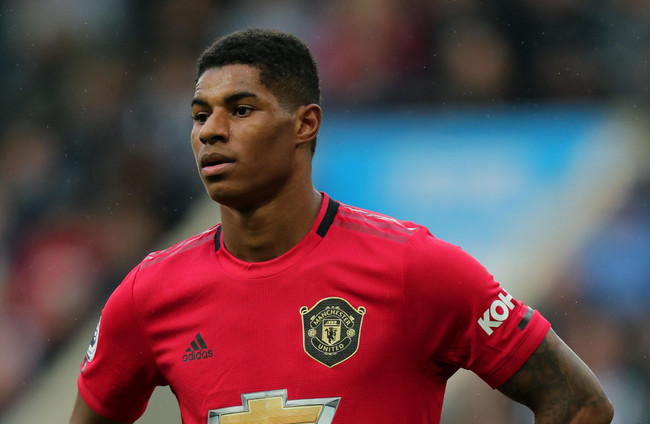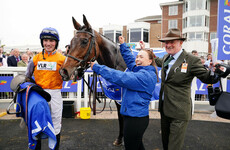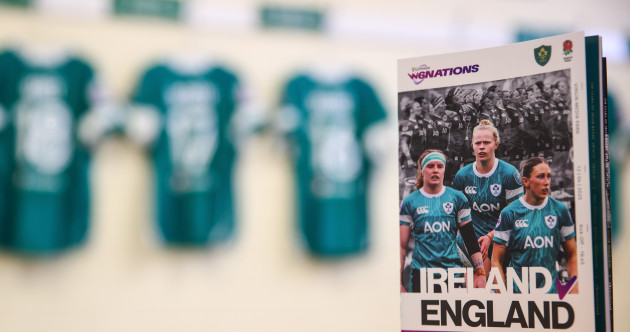THE FOLLOWING PASSAGE is an extract from ‘The Dream Factory’ by Ryan Baldi.
‘How can I help?’ wrote Marcus Rashford when he first approached FareShare via email in February of 2020.
The Manchester United forward had been inspired by the food-distribution charity’s ActiveAte initiative the previous summer, which sought to supply food to vulnerable children during school holidays.
He was concerned the looming pandemic would see yet more kids from low-income households go hungry in the months to follow.
‘It’s very rare to have an inbound offer, and an offer that says, “What do you need and how can I help?”’ says Alyson Walsh, FareShare’s commercial director.
By the end of June, Rashford had helped raise around £20million for FareShare, shattering his initial target of £100,000.
He’d also lent his support to the Black Lives Matter campaign, spoken out against online bullying and successfully campaigned for the government to overturn its decision not to extend the free-school-meals scheme over the summer holidays and implement a £120million ‘Covid Summer Food Fund’ which reached 1.3million children.
Later in the year, Rashford conducted himself like an adult among squabbling children when Parliament, by a margin of 322 to 261, voted against a Labour Party motion to, as the footballer had implored, extend free school meals into October’s half-term break and beyond.
On several occasions, he appealed to MPs to put aside party politics and sniping for the greater good, aiming to smooth tensions more tribal even than those he overcame in earning the support of rival fans, players and clubs.
He also took to social media to request that his followers refrain from directing abuse at these politicians, citing his own experience as a target for online bile as something no one should have to endure.
Inspired by Rashford’s fight against child food poverty, and sharing his despair at the decision to curtail the scheme – which had provided meal vouchers worth £15 a week to children in low-income families outside of school term time – cafes, restaurants, pubs and even local councils around the country began to pledge to fill the gap.
Rashford’s Twitter timeline was alight in late October as he retweeted these organisations, notifying his followers of where the free food for the vulnerable could be found.
He was awarded an MBE in the Queen’s birthday honours that month, to add to the PFA Merit Award and recognition from the Football Writers’ Association, the City of Manchester and the Pride of Britain awards.
Rather than allow these accolades to bookend a job well done, though, Rashford’s admirable off-field work continued.
In November, he forced yet another about-face from the government, with Prime Minister Boris Johnson personally calling the United forward to confirm a pledge of £170million to combat child food poverty through the winter and into the new year.
This announcement came just days after Rashford teamed up with fashion brand Burberry to launch a series of initiatives to help disadvantaged people, including a £25,000 grant to two youth clubs he attended as a boy and a donation to FareShare that would finance 200,000 meals.
In a letter to his 10-year-old self, he penned for the campaign, Rashford wrote: ‘For a young boy who says so little, one day you will have a voice that speaks for many.’
At the outset of the coronavirus pandemic, in April 2020, the UK’s Health Secretary, Matt Hancock, took aim at Premier League footballers during a televised national briefing. Hancock suggested these high-paid sports stars ought to ‘make a contribution, take a pay cut and play their part’.
It was a craven attempt to deflect focus from the scrutiny the government’s handling of the virus was beginning to draw, and to jab an accusing finger at a group often viewed by the wider populace as overpaid and underworked.
Single-handedly, Rashford, through his social contribution and activism, made a mockery of the Health Secretary’s swipe at footballers.
Rashford’s efforts are informed by his own experiences. He spoke openly at the time about how important free school meals were to him as a child, and how hard his mother, Melanie, a single parent of five, had to work and budget to keep the family fed.
‘It’s definitely because he remembers his family, he remembers he was on school dinners and how difficult it was for his mum,’ says Dave Horrocks, chairman of Fletcher Moss Rangers, Rashford’s first grassroots club.
And early signs of the conscientiousness and empathy that have marked out Rashford’s activism can be found in his progression through United’s academy.
United make a concerted effort to instil such values in their youngsters – ‘right is might’, first coined by former director of youth football Jim Ryan, is an often-repeated mantra within the Carrington hallways.
Politeness to all staff and visitors is demanded, and on tournament trips abroad, the boys take turns making speeches to thank their hosts, presenting pennants to opponents and gifts to hotel workers.
‘Marcus would have had to do it a few times,’ says Colin Little, the United under-18s coach. ‘They all get a chance at it, to go and speak to the man in the canteen or go and give him a signed shirt. I’m sure other clubs are doing it, but when I got here, I’d never seen it before. You look at Marcus now, and you think, “Wow, what a good spokesman.”’
But Tony Whelan, United’s assistant academy director and one of the main drivers of the club’s desire to develop empathetic individuals as well as top-class footballers, is quick to play down the academy’s role in Rashford’s inspirational off-field work.
‘That comes from God, I think, a young man to do that,’ he says. ‘Obviously, he’s had support and he’s had role models – his parents, his mother in particular, and others. That comes from within, that comes from him. It’s like your Mother Teresas of this world, your Dr Martin Luther Kings. People do some wonderful things, because somehow, within their being, God has given them that gift, and he has had that gift. So I don’t think it’s something that anybody else should take credit for in that sense.
‘For us to see it with a young boy within our tenure at the club, those that have been around him and have had the privilege to work with him, it does give you a sense of pride. I wasn’t expecting that when he was nine or 10 coming into Man United’s academy. We want him to go as far as he can, in terms of football and obviously be a really nice boy, and if he leaves us in the future, then he’s going to go with a set of life skills that will help him on his way. We’re not thinking he’s going to be doing what he did, and being Dr Rashford at 22 [the University of Manchester awarded Rashford an honorary doctorate in July 2020] and doing just an amazing, amazing thing. It gives us a great sense of pride.’
Whelan is right to point out that Rashford’s drive to effect real change on a national scale for those most in need goes far beyond anything United’s academy coaches could expect their players to achieve outside of the game.
But the club’s ‘right is might’ philosophy provided a foundation upon which Rashford’s charitable, empathetic and altruistic sides could flourish.
While others might not go as far or do as much as Rashford, basic values of decency are taught and instilled in these young players as part of a holistic development package.
‘Hopefully we created the kind of environment in which a young person could express himself in that way,’ Whelan says. ‘I think that’s the thing. If we can set environments that say, “Look, nothing is impossible. You can achieve whatever it is you want to achieve in your life, whether it’s through football or anything else.”’
‘Man United are, without doubt, the best at it,’ Little adds. ‘Tony Whelan and [academy player liaison officer] Dave Bushell are the fabric of the club. Paul [McGuinness, the former United youth coach] calls them guardians of the United spirit. If you’ve got a core of people pushing those values, you just keep drilling it home to them. It becomes the norm. Then Marcus takes on the mantle, and you see Axel Tuanzebe doing it.
“Right is might” – it becomes who they are. They’re so grounded, and it’s because of the groundwork of Tony Whelan, Paul McGuinness in the past, and [academy manager] Nick Cox has carried on that work.
‘It’s not fake. It’s real. It’s not just faking it to show how good we are. And it’s proof that Marcus has done what he’s done now, caring about other people.’
Whelan, now in his late 60s, was a young player at United himself. He came through the club’s youth system at a time when it was overseen by Jimmy Murphy, one of United’s most revered and influential coaches, after whom their Young Player of the Year award is named.
Although he never played a competitive first-team game, Whelan became only the second black player to represent United when he made his debut in a friendly in 1969.
He later joined Manchester City and spent some time in American soccer. He retired from playing football in 1983, after suffering a broken leg while turning out semi-professionally for Witton Albion.
From there, he made the curious career leap into social care, working with vulnerable children in Manchester. Whelan returned to United as a coach in 1990, and he has been a fixture of the club’s youth set-up ever since.
He has combined his coaching career with a thirst for learning, attaining an Open University degree in humanities and a master’s in sociology from Manchester Metropolitan University.
He then decided to pursue a doctorate as a means of professional development, an alternative, he saw it, to obtaining a UEFA Pro Licence coaching badge – ‘That’s for senior football,’ he says. ‘I work in youth football.’
In 2015, he successfully completed his PhD, entitled Pastoral Care of Premier League Academy Schoolboy Footballers. Informed by his chosen topics of study and social-care background, no individual has had a greater influence over United’s approach to rearing well-rounded youngsters within their academy.
‘We’ve always believed that we had a responsibility to ensure that our young people grew not only as footballers but as human beings,’ Whelan says, ‘because at some point they are going to leave the club and, if they leave football, go into the wider world. So they need a set of skills – basic human skills that they need to survive and get on in the world. That was handed down to me from being at the club back in the day, from Sir Matt Busby, from Jimmy Murphy, from having to wear the club blazer, having to wear the tie, turning up properly, being respectful to people. I always remember going up to the laundry at Old Trafford when I was an apprentice, and the laundry ladies were like goddesses. You were told if you go and speak to the laundry ladies you had to be on your toes, you couldn’t be disrespectful or not do what you were told.
‘We were passing that on, making sure they follow in the footsteps. We made sure the young players, if they went on a trip, looked after the hotel, they knew how to look after their bedrooms. We used to tell them, “You’re responsible for the rubbish in your room. When the cleaners come in, all they should have to do is change the bedding. That’s it.”
‘And in and around the hotel, your pleases and your thank-yous, and training young people up to be able to give a speech to the head waiter in the restaurant at the end of a trip, to be able to present a pennant or a gift to the tournament organisers or the person that had been assigned to the team, making sure that they were being embraced and included as part of the family.
‘We were always strong believers that it was important for them as young people to understand that being a footballer – particularly being a footballer at Manchester United and going on tour overseas with Manchester United – was a privilege and an honour and something that they should really treasure.
‘And with privilege comes responsibility, the responsibility to do those things, because you’re an ambassador for the club, you’re an ambassador for football, and you’re also an ambassador for your family. You want your parents to be proud of you. You want to be proud of yourself. And you want the staff at the football club to be proud of you because you’ve represented the football club in the right way. That’s it, really. It’s not rocket science. We’ve always tried to do that.’
The players lucky enough to maintain a place within a top-level academy, those who avoid being released long enough, have the opportunity to see the world.
From as young as nine or 10 years of age, children within United’s academy will travel to continental Europe or even farther afield for tournaments.
Whelan is keen to ensure that when the players visit far-flung locations, especially those rich in culture and history, they are able to remove the football blinkers, to see and absorb their surroundings.
‘Whether it’s a big city or a small village, there’s somewhere that’s the centre,’ Whelan explains.
‘We make a point of making sure we go there. I used to say in advance to our staff in the office, “What’s the place? Where are we going?”
‘We used to email ahead and say, “We’d like to go to such and such a place”, to take the kids. You don’t want them to go to a country just to play football. They’ve got to experience the country, eat the food, go and see the place. One of our junior coaches does a little booklet for the players, and in the booklet, there will be little words and phrases and a little bit of history of the country, what’s the food and how do you say “hello” and “goodbye”, things like that. It’s so educational.
‘We went to Budapest with an age group. Ferenc Puskás, he was one of my heroes. I always remember thinking, “Budapest. Puskás. Wow.” I remember saying to Claire in the office, “We’re going to Budapest, can you ask if we can go and see Puskás’s tomb?”
‘We got a special pennant made that had his name on. We got there on the Friday, and the tournament was on the Saturday. In the morning, in the coaches’ meeting, the guy said, “We’ve made an arrangement with Man United to go and see Puskás’s tomb tomorrow morning if you’d like to join them.”
‘Everybody went. All the teams went. We go to his tomb. It’s in the vault of this church. We lay our pennant. All the other clubs do the same. They made it a tradition. It was wonderful. To me, that’s football. We had our photographs taken, and I treasure the memory, because that was educating a young person. You help to educate them about football then. You tell them about the England game in ’53. You tell them this guy scored three goals. You tell them he scored three goals in a European Cup final, in the first half, and lost. You teach them not only about a great footballer, but about Hungarian culture.
“This is where this guy was from. You’ve been to his grave. Where we’re going to play, in this stadium, he played.” You can’t buy it, can you? And I’m in a privileged position to be able to do it. What a huge honour, and I’m always conscious of it.
‘We tell our players all the time that you’re following in the footsteps of these people. We have shirt presentations before tournaments, and we’ll say, “Right, there’s your shirt, you’re following in the footsteps of Duncan Edwards, Bobby Charlton.”
‘We use it as an educational experience. It’s an opportunity – don’t waste it. Are we going to sit in a hotel room for four days and not teach them about football, not teach them about Man United, not teach them about culture – not only about the history of football and our football club but of the country they are in? To me, that’s the absolute raison d’être of what we do. We wouldn’t want to lose that.’
Whelan’s commitment to providing an education for his players beyond the techniques and tactics of the game is born of the same protective instincts that saw him choose social care as a career after football, of his reverence for history and appreciation of the privilege of his position. But he also sees it as being indelibly connected to the primary concern of his role – to produce footballers for Manchester United, to raise more Rashfords.
‘If you can improve them as a person, as a human being, you’ll automatically improve them as a footballer,’ he says. ‘One of the problems we’ve got in our game is that we get it the other way around. I’ve always thought that if we sort the kid out first – the stuff that’s off the pitch, get all that sorted out – the football is easy.’
The Dream Factory’ by Ryan Baldi is published by Polaris. More info here.













Come out of a ‘lower level’.
@Bbballs: Are you suggesting he hasn’t?!
Good win after last week’s debacle
Better style of play
I’ve followed this lad since he was at Shamrock Rovers and he always gave off an aura of massive self belief – he’s got all the right mental attributes to make it
Showed great composure for his assist.